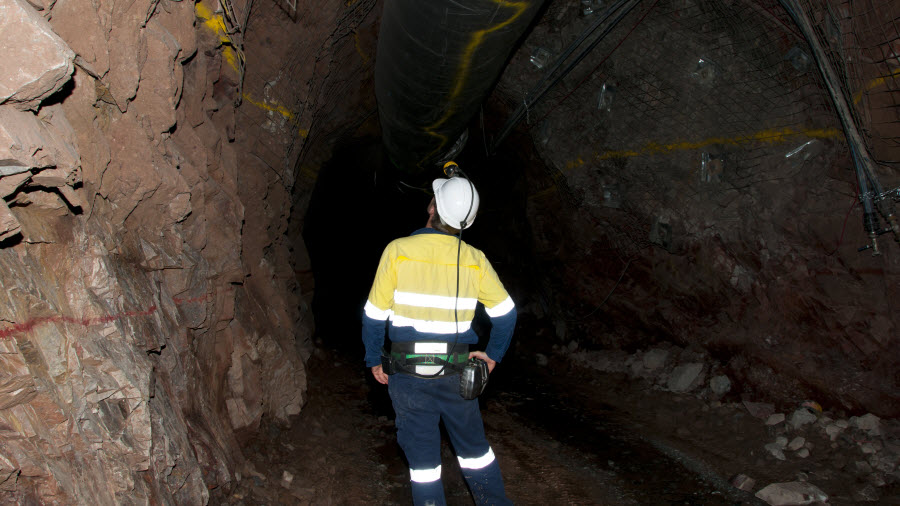Global S&T Development Trend Analysis Platform of Resources and Environment
| FIFO: Navigating job search challenges during the pandemic | |
| admin | |
| 2021-04-23 | |
| 发布年 | 2021 |
| 语种 | 英语 |
| 国家 | 国际 |
| 领域 | 地球科学 |
| 正文(英文) |  FIFO mine worker. File image.
The pandemic has reshaped the way many companies do business, and at the onset over a year ago, the world saw a massive shift to remote work with onsite operations grinding to a halt and mines being temporarily suspended as majors and minors moved to enact measures to protect against the spread of covid-19. The mining industry is heavily dependent on a skilled workforce working onsite at remote locations, and during the pandemic Fly-in-Fly Out (FIFO) workers have faced significant challenges. Rob Tyson, director of Mining International Ltd, who specializes in recruiting top talent through search and select methodology across in the c-suite, management and technical space, offers some insights to navigating the challenges, in the second of a MINING.com series on employment trends in the industry. MDC: What are some of the biggest challenges mining industry recruiters are currently facing? Tyson: People movement – Reduction in free movement of international FIFO candidates and clients to and from site are proving a challenge. Various governments around the world have implemented varying degrees of measurements of entering countries to non-citizens which has put a strain on mining operations, therefore limiting recruiters choice of applicants for certain expatriate roles. We have just had a candidate’s offer acceptance been withdrawn because of the uncertainty around visa approval (after being pre-approved) and getting in and out of the country. Companies are now having second thoughts around employing FIFO expats due to this; Longer rosters – Many mining operations have extended their FIFO rosters which has had an impact on expatriate workers. Depending on their own individual/family circumstances, the longer rosters coupled with quarantine periods that their home countries have adopted can make it a less attractive option for some which puts pressure on the amount and availability of suitable candidates for a particular vacancy; Nationalisation – Because of governments opening and closing borders due to covid, mining companies are looking to nationalise more roles than previously due to uncertainty and governments control and restrictions of borders.  MDC: What about the challenges job seekers face? Tyson: Not enough open jobs in the industry (ex-pat) – there seems to be a lot more job seekers/applicants seeking new jobs plus many current employees who would consider new employment opportunities if presented to them than the amount of jobs out in the market place, creating more competition for roles; No feedback from their applications – Every increasing frustration among job seekers around not receiving any feedback or notifications around their applications. This is the biggest and most often challenge I hear from job seekers and we often provide free advice on how to get around these issues so you can increase your chances of an interview; Extension of rosters – Many mining companies have extended their rotations, some have doubled to stem the flow of employees entering and leaving sites. These roster extensions will have implications on some job seekers as to whether they will apply or accept a role which may be dependent on their individual circumstances; Effects of covid – Some job seekers who have caught covid severally maybe be reluctant to travel overseas for work depending on the location because of the hosts’ health policies and hospitals. MDC: How can these challenges become opportunities? Tyson: The moderns job seeker – With every crisis, there are opportunities. With job seekers low feedback rate on applications, the new job seeker needs to work on strategies to solve this issue. I believe the follow-up method I explain to job seekers whom I help will increase your chance of getting an interview;
Change your mindset – Job seekers need to change their mindset and not think what they have done in the past to get a job will work in the future. With the age and advances in technology, it seems more complicated to get a job whereas in theory, it maybe not as difficult but it’s a different way of getting that interview; New entrants into expat mining – With an aging workforce especially in the mining industry, many skilled mining professionals are fast approaching retirement so this gives way for young mining professionals after a minimum of 5 year’s experience to get into an expatriate role. This will be a steep learning curve although some will relish the benefits and opportunities it will give them from the experience; The green economy – With governments all around the world pushing for a greener economy and improved energy sources, mining is at the beginning of a commodities supercycle to supply governments around the world with these raw materials to deliver on what they have promised. This means there are going to massive opportunities for people within the industry with more job opportunities in the future; MDC: How has the pandemic impacted the recruitment process? Tyson: The pandemic hasn’t effected the actually recruitment process too much in terms of expatriate recruitment as interviews have generally been done over skype/phone and now more so with teams/zoom. Challenges have included delays in issuing visas and borders closing thus not allowing new candidates starting on site unless they have been given special passes to enter the country. The lead time of the recruitment process has been extended in some cases because of this. Impacts are around uncertainty from mining companies as well as candidates. With the opening and closing of borders at will be governments, companies are analysing whether they should nationalise that vacancy instead of employing an expat due to many factors I have explained. Candidates on the other hand, are of two minds as to whether they should accept an expat FIFO role due to uncertainty of getting out of the country they are working in and back into the country they reside in which could mean being longer away from families and loved ones. MDC: With the required shift to remote work, do you see a return to a traditional office environment? Tyson: We believe there will always be a need for an office type of environment or a collectiveness of employees within a company. Employees/management still need to discuss, brainstorm and implement plans and although some can be done remotely, some will always need to be in person. I mention office type of environment which could suggest something different to what we have been use to. What this could be, I’m not too sure but there seems to the acceptance of remote working more than ever before so it depends how these two will combine moving forward. With 20 years of industry experience, Tyson is also the host of “Dig Deep, The Mining Podcast” that first aired in 2018 and, across 165 countries, provides interviews with mining executives and professionals where they discuss, educate and discuss industry news, hot topics and company reviews from across the globe.
|
| URL | 查看原文 |
| 来源平台 | Minging.com |
| 文献类型 | 新闻 |
| 条目标识符 | http://119.78.100.173/C666/handle/2XK7JSWQ/323068 |
| 专题 | 地球科学 |
| 推荐引用方式 GB/T 7714 | admin. FIFO: Navigating job search challenges during the pandemic. 2021. |
| 条目包含的文件 | 条目无相关文件。 | |||||
| 个性服务 |
| 推荐该条目 |
| 保存到收藏夹 |
| 查看访问统计 |
| 导出为Endnote文件 |
| 谷歌学术 |
| 谷歌学术中相似的文章 |
| [admin]的文章 |
| 百度学术 |
| 百度学术中相似的文章 |
| [admin]的文章 |
| 必应学术 |
| 必应学术中相似的文章 |
| [admin]的文章 |
| 相关权益政策 |
| 暂无数据 |
| 收藏/分享 |
除非特别说明,本系统中所有内容都受版权保护,并保留所有权利。
修改评论